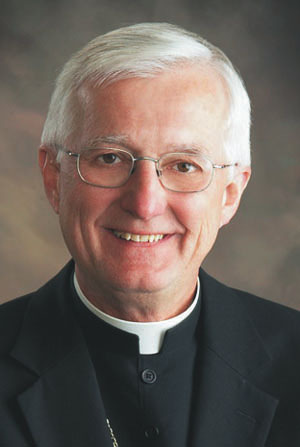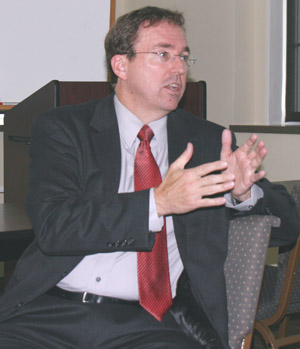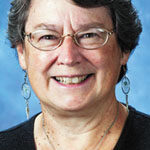By Barb Arland-Fye
The Catholic Messenger
Iowa’s bishops have approved a list of legislative priorities for 2017, some of which will receive extra attention: mental health funding, gun safety, the Medicaid transition to managed care, racial profiling and restorative justice, and water quality.

“These issues do not supplant other important issues, such as education, immigration, pro-life and an increase in the state’s minimum wage,” emphasized Bishop Martin Amos of the Davenport Diocese. “How all of these issues fare in the Iowa Legislature will depend in part on who has control of the House and Senate,” he noted.
The Iowa Catholic Conference’s (ICC) Board of Directors, which the bishops lead, passed the legislative agenda Oct. 20. Input for priorities came from a variety of sources including the bishops’ staffs, the people they minister to and individuals who attended Faithful Citizenship forums in Iowa. The ICC’s Human Life and Dignity and Education committees formulated this input into the legislative agenda, said Tom Chapman, executive director of the ICC. (See the priority list sidebar.)
He noted that he gave about a dozen presentations on Faithful Citizenship in Iowa this year and “In every single meeting, mental health funding and the Medicaid transition came up — without any prompting from us. Those issues are on people’s minds, and we should be discussing them as well.”
Iowa ranks 49th out of 50 states in the number of available state mental health beds. While Chapman admits the problem is complex, one of the challenges is a shortage of providers to treat individuals with mental illness. Funding is another issue, with some counties paying more than their fair share because of a state-imposed property tax cap that has been in place since 1996. Meanwhile, the state redesigned its county-based mental health system to a regional system in 2013, with each of a region’s counties required to provide property tax dollars to pay for services. The state, however, has not been funding its anticipated share of services, Chapman said. He noted that because of the cap on spending, some small, rural counties are subsidizing growing counties. The Human Life and Dignity Committee recommended that the ICC consider supporting efforts to remove the cap. Or, the state could decide to fund the services directly.
Concerns about privatization of Medicaid, the primary health insurance for an estimated 560,000 Iowans, also resonated with Iowa’s bishops because of reported negative impacts on some consumers and providers. Earlier this year, Iowa transitioned from a fee-for-service to managed care system with private companies administering Medicaid. The Human Life and Dignity Committee received reports that some people no longer receive needed care or deal with hardships such as changing doctors, traveling longer distances for care, or having their privacy compromised. Some medical providers and services no longer accept Medicaid or have experienced problems with reimbursement, expenses and administrative requirements. The bishops have consistently supported initiatives that would make health care more readily available and affordable to all Iowans, Chapman said.
Gun safety is another issue of special concern to Iowa’s bishops, their fellow bishops nationwide, and the universal church. The bishops accepted the Human Life and Dignity Committee’s recommendation for the ICC to support reasonable measures to control the sale and use of firearms, including universal background checks for all gun purchases – public and private. Other potential bills that may come before the Iowa Legislature in 2017 include requirements for reporting failed background checks at the local level and background checks for assault-style weapons. The U.S. Conference of Catholic Bishops (USCCB) supports a universal background check for all gun purchases, the limiting of civilian access to high-capacity weapons and ammunition magazines, making gun trafficking a federal crime, and improving access to mental health care for those who may be prone to violence. The Human Life and Dignity Committee pointed out that the U.S. bishops have called for the eventual prohibition of handguns for civilians.
Racial profiling and restorative justice are two other high priority issues. The Human Life and Dignity Committee reported that Iowa ranks among the worst in the nation for racial disparity in searches, arrests and incarceration for minor drug offenses. Nearly 1 in 10 black men are incarcerated in Iowa. The violation of rights and cases of police brutality against people of color has resulted in some law enforcement agencies paying large settlements. The committee recommended that the ICC continue to encourage efforts by legislators to address racial issues.
The ICC supports a constitutional amendment clarifying that nonviolent crimes do not disqualify an individual’s right to vote. Voting rights would be restored after completion of jail or prison sentences or parole. The ICC has previously supported legislation to this effect.
Another special concern of the ICC for 2017 is the environment. The ICC supports measures to preserve, protect and improve the quality of air, water and land in Iowa. A proposal to add three-eighths of a cent to the state sales tax to help fund programs such as Iowa’s voluntary Nutrient Reduction Strategy remains a subject of discussion. The ICC believes that taxation in any form should be based on one’s ability to pay. Rather than taking a stance on a specific proposal, the ICC has decided to share its principles on the environment.
Faithful citizenship in Coralville
Tom Chapman, executive director of the Iowa Catholic Conference, spoke about faithful citizenship at St. Thomas More Parish in Coralville on Oct. 18.
Chapman opened his presentation by talking about the ways someone can become involved in the political process as it relates to individual issues. He then asked the crowd to explore the role of conscience in politics and how that differs from person to person.

Chapman brought up key themes of Catholic Social Teaching, including “care for the common good” and “life and dignity of the human person.” The group explored the questions they should be asking political candidates in relation to these themes. The list Chapman provided as reference included questions about marriage, gun rights and treatment of prisoners.
Persons wanting to know more about faithful citizenship can go to www.faithfulcitizenship.org or iowacatholicconference.org.











